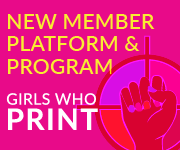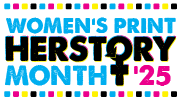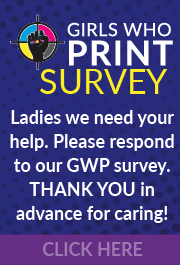2022 is the Girls Who Print Year of Mentorship and we have been talking about it, programming about it, and turning words into action.

What you may not be aware of, is there are many types of mentoring relationships. Today I am going to outline some different ways that you might enter into a mentoring relationship, whether as a mentor, mentee, or somewhere in between.
Traditional Mentoring
In a traditional mentor/mentee relationship, a seasoned person gets matched up with a person just getting started on a career path. They meet regularly to discuss issues and challenges the mentee might face. Speaking from personal experience as a mentor, the relationship can last years. As the mentee gains experience and confidence, the frequency of contact might reduce over time from weekly or bi-weekly to monthly to quarterly as needed.
The Drop-In
Sometimes, a person might need to access a particular set of skills of a colleague to solve a problem, gain some information or resources, and then move on. This might involve one conversation, a number of conversations, or some emails exchanged. There are no rules here. The understanding is that at one time or another, we all need a bit of help or a sounding board. At one time or another, we all find ourselves in a position to help.
The Finite Engagement
Recently I had someone reach out to me needing something particular regarding how something worked within her organization. She really only needed to speak to someone with a very particular skill set/experience for about, no joke, a 20-minute conversation. I figured out who I knew who could help her, connected them, and never heard from either of them again. I hope that one worked out. If it didn’t and you are reading this, please reach out.
The Reverse Mentor
Traditional wisdom would have us believe that mentors are usually older and more experienced and mentees are usually younger and just getting started in their roles. But here’s the thing. In many cases, a younger person might bring a fresh perspective or a new skill, and that perspective or skill might be something that has been missing from the organization. In one case, a summer intern was able to demonstrate the importance of using different social media platforms like TikTok and Instagram. That same intern, when she was permanently hired after graduation, brought all kinds of new thinking including examining leads generated from the website. She did a deep dive into the win/loss percentage of quote requests to actual job conversations, which has caused the company to reexamine its user experience and even the copywriting of the website. Here is a great article that emphasizes the “reverse” mentoring relationship.
Mentoring benefits everyone. If you have been hesitant up until now to enter into a relationship because you are concerned about the time commitment or your ability to be a mentor based on your experience or lack thereof, I hope that I have helped you see that there is a place for EVERYONE at every stage to be or have a mentor.
You can apply here for our FREE matching program.





